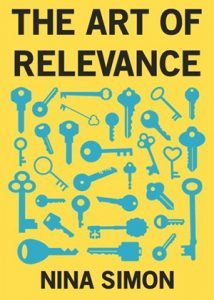Staying competitive in our industry is critical for all of us, but it is becoming more challenging. We are all well aware of the many issues our industry faces. However, from my perspective as a 40+ year industry veteran, it is amazing just how resilient and successful our industry has always been.
Why is our industry so resilient? We have continued to be relevant to investors! But what does it take for us to continue to be relevant to an ever-changing market and client base?
Learning from Museums

The Art of Relevance by Nina Simon, the executive director of the Santa Cruz Museum of Art & History, explores what makes museums relevant to diverse groups of people. I thought her insights on relevance were also instructive to our industry. In her book, Simon writes that “information only becomes relevant if it is perceived as adding new meaning and makes a valuable difference for the audience.” But there is a catch: the more effort required to access, acquire, and use any new information, the less relevant it becomes to our clients and prospects.
Simon goes on to note that “there are two kinds of people in the world of relevance, insiders and outsiders. If you want to engage people who don’t even know your organization exists you must find a way to open new doors that clearly speak to their needs to welcome them in.” In the financial industry, we must strive to create meaning and value for increasingly diverse audiences who have little spare time to engage.
Age of Acceleration
We are in an information-intensive world; Thomas Friedman in Thank You for Being Late describes this as the “Age of Acceleration.” (Friedman’s premise is that being late is actually a gift of free time for the host!) Rules and regulations governing potential conflicts have reduced the time spent on building personal relationships. Strong personal relationships are relevant as they build trust and reduce artificial barriers for ease of access. How do we get through all the noise in the “Age of Acceleration” to be heard? How can we continue making valuable differences that are easy for our clients to comprehend and access? How should each of us think about staying relevant?
The One-Minute Manager, co-written by Spencer Johnson, was a 1980’s classic, and it is still being bought today because its value and accessible style continue to make the book relevant. Johnson also wrote Who Moved My Cheese?, a bestselling parable about the need to accept and adapt to change. It made the point of how silly we all can be when we dig in our heels. In the “Age of Acceleration,” adapting to change is relevant. We all need to accept and adapt to change for the benefit of our clients and our firms.
Johnson gave his readers what they wanted to know in a very relevant way—brief and to the point, with valuable take-aways and insights. Perhaps if we all took that approach with our client letters, research reports, and presentations we all might become more relevant to our clients.
The Benefits of Brevity
It is said that an audience rarely remembers what was said but they do remember how the speaker made them feel. How do clients feel when your reports and presentations are opaque and complex?
Nina Simon notes: “When our institutions’ offerings are too opaque or require too much effort to access, we become irrelevant. Our doors aren’t just hard to access. For most people on the outside, the doors don’t even exist. People can only survive in an information-dense, accelerating world if they can easily pick important things to focus on and tune others out.”
There unfortunately is no middle ground between being relevant and irrelevant! If we have something meaningful to say, we should write it clearly and succinctly, emphasizing the value to be gained from the message. Save the nuances for the in-depth conversations you are much more likely to have if the initial message is truly relevant to your audience.
A Sept. 1 FundFire article quoted an endowment fund investment committee chair as saying, “When managers or consultants do get to present to boards, they need to focus on relevant content and not squander their allotted time making empty sales pitches or going too far into the weeds.”
If we don’t have anything new or meaningful to say we don’t need to say it. It won’t be missed. Greg Allen and I try to write an annual letter to Callan’s clients but not on any precise schedule. We wait until we have something relevant to say to them.
Blogs (like this one!) have become quite popular because they can provide insightful value that might be missed if not for their brevity. Callan’s surveys and white papers are produced without formulas and complicated charts so we can clearly communicate important insights to readers at all levels of investment knowledge. We try to open doors to new readers by making our research easily accessible not only to our clients but to the entire industry.
We all need to take a good look at our message to the market. Are we opening doors or closing them? Does our messaging add valuable insights that are easy to understand? If we are going to keep being competitive as an industry we must continue to stay relevant.

